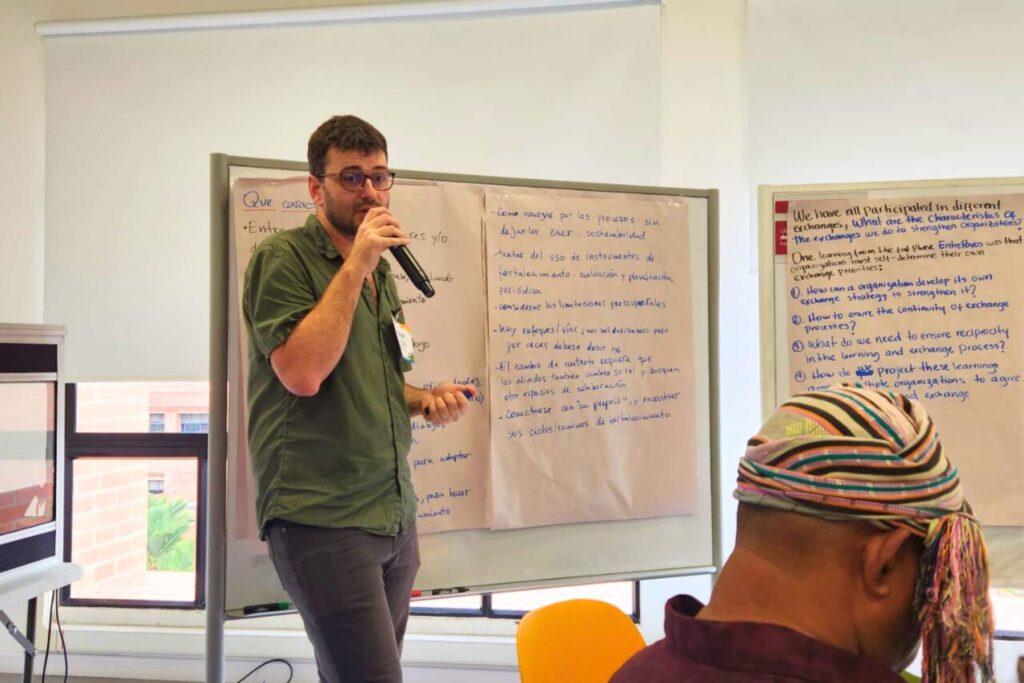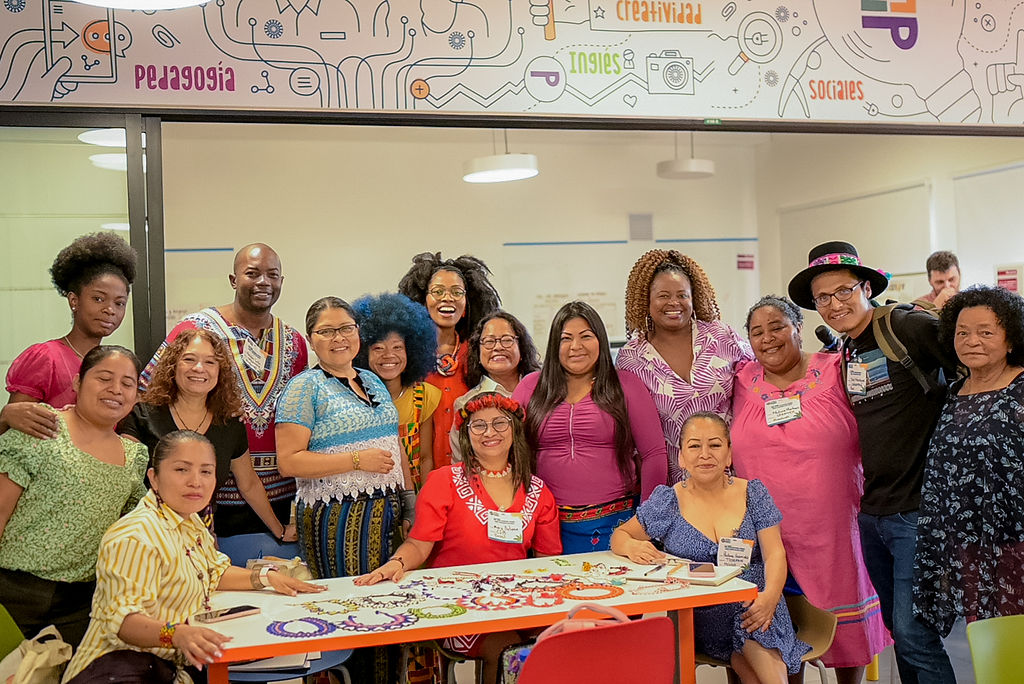The “Second Encounter of Indigenous Peoples, Afro-descendants, and Local Communities” event. Cali, Colombia, February 2024. IMAGE CREDIT: Entre Povos
- Rainforest Foundation US (RFUS) is advancing its Institutional Strengthening program to support Indigenous partner organizations across Central and South America to become stronger and more effective in protecting their forests and rights.
- RFUS participated in an event that brought together more than 50 Indigenous, Afro-descendant, and traditional communities in Colombia in February 2024.
- The event fostered dialogue on moving away from donor-led models of institutional strengthening to Indigenous-led perspectives.
- This dialogue is expected to set new standards for institutional strengthening, moving toward a more equitable, non-compliance-driven, and partner-led process.
In a world where the voices of Indigenous, Afro-descendant, and traditional communities are often sidelined, it’s imperative to create spaces that prioritize these perspectives to foster meaningful shifts within the funding ecosystem. In February 2024, Entre Povos—an initiative whose purpose is to strengthen institutions and advance its member organizations’ rights to good lives—organized a gathering in Colombia to promote dialogue, exchange, and learning among these communities.

This gathering—”Segundo encuentro presencial de organizaciones indígenas, afrodescendientes y tradicionales socias del Programa Build”—brought together more than 50 participants, including a member of the RFUS team and many of its Indigenous partner organizations, to strengthen ties and share strategies about organizational governance. Additionally, participants were encouraged to reimagine what it means to strengthen from within—according to their own visions and values—rather than through donor-proposed models, a paradigm that has historically created unbalanced power dynamics.
RFUS’s Capacity Strengthening Program Senior Manager, Victor Gil, attended the event. It was a great opportunity to learn directly from Indigenous, Afro-descendant, and traditional communities how we can best bolster the growth and resilience of organizations that we support.
“Indigenous organizations are building strong foundations to be able to effectively secure their rights and territories, so investing in their institutional strengthening is vital.”
Gil explained that “Indigenous organizations are building strong foundations to be able to effectively secure their rights and territories, so investing in their institutional strengthening is vital. We support partners in doing this in several ways, including through strengthening their governance, finance, and administrative systems. Providing this kind of support enables our partner organizations to increase their impact and become more resilient in navigating challenges and in securing funding to implement their work.”
Rainforest Foundation US is advancing its Institutional Strengthening program to support Indigenous partner organizations across Central and South America to become stronger and more effective in protecting their forests and rights. Gil and other team members work closely with these organizations and blend strategy, resource development, and hands-on, on-the-ground support. They travel regularly to meet with partners to assess their needs and better understand their vision before co-creating with them strategies to bolster their efforts to protect their territories and create more sustainable livelihoods.
At this event, Entre Povos facilitated a critical and innovative dialogue on redefining institutional strengthening from the standpoint of Indigenous, Afro-descendant, and traditional organizations rather than building from more traditional, donor-led perspectives that are often imposed on these communities. “These types of dialogues contribute to defining new approaches for institutional strengthening, which should imply changes in how donors and these organizations establish their relationships in the medium to long term. We expect a more horizontal, partner-led institutional strengthening process that’s less compliance driven in the future,” Gil said.

“We reflected on how we understand these concepts [of institutional strengthening], concepts that are partly defined by donors, but which are also related to the life of our movements and organizations.”
For Margarida Antonio, an Indigenous Miskitu woman from the Krukira Community in Nicaragua and leader of Entre Povos, the event provided opportunities to meet in person to discuss institutional strengthening from their own perspectives. “We reflected on how we understand these concepts, concepts that are partly defined by donors, but which are also related to the life of our movements and organizations. And we also discussed how this relates to how we sustain ourselves. For example, we primarily sustain ourselves through our work, but many of the things we need in the institutional strengthening processes have costs. We often can’t take steps because we don’t have the needed resources.”
A common challenge for many Indigenous organizations is balancing modern, Western organizational models with their traditional governance systems. Fulfilling donor expectations and representing their communities’ interests can also be problematic. RFUS co-creates its programs with partners to ensure our support is culturally relevant and tailored to each partner’s specific needs. Despite growing donor interest in directly supporting Indigenous-led initiatives, navigating complex funding processes is still a challenge. To address this, RFUS assists its partners in managing these processes and advocating for more inclusive and respectful funding practices.
“Too often, development and other initiatives are imposed on us. However, this approach originates from the communities themselves.”
“I believe this new perspective is crucial for indigenous communities because, too often, development and other initiatives are imposed on us. However, this approach originates from the communities themselves, which is significantly more important. It ensures greater ownership of the process by the communities, making it much more intrinsic,” said Graham Atkinson, Project Coordinator of The Amerindian Peoples Association (APA) from Guyana.
Attendees shared that despite their diverse experiences, all felt their institutional strength is inherently linked to the territories they defend and their cultures.
“This is a strong reminder for us—supporters and donors—that for Indigenous organizations, institutional strength is inseparable from the territories they protect and the values that guide them,” Gil pointed out. “After witnessing firsthand the transformative impact of having the right resources and tools to advocate for their rights and control their territories, this only reaffirms RFUS’s commitment to supporting self-defined approaches to institutional strengthening with our Indigenous partners, rather than drawing from donor-defined models of success.”








